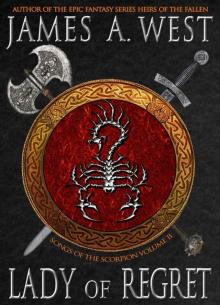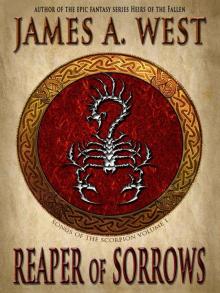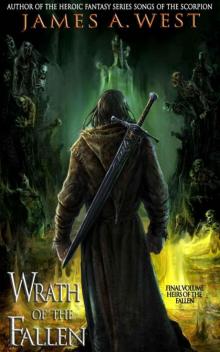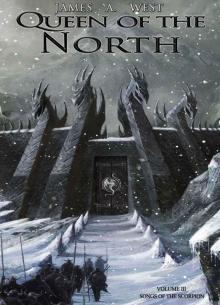- Home
- James A. West
Heirs of the Fallen: Book 03 - Shadow and Steel Page 10
Heirs of the Fallen: Book 03 - Shadow and Steel Read online
Page 10
“You came to the Throat of Balaam, intending to help? You are either you are a fool, or a liar.”
“Then why are you here?”
“To grieve.”
Leitos kept quiet for a moment, then asked, “What is this Throat of Balaam?”
His captor spun him around, slammed him against the tree, and pressed the tip of a broad knife into the fold under his eye. At the sight of her, Leitos’s breath caught, his legs quivered. Zera’s ghost lurked in this girl’s face and pale green eyes.
As surely as shock held him, it clutched the girl. “You!” she said. “Why are you here?” she demanded.
Leitos tried to speak, but no words came. A leather thong held back her short dark hair. Smears of dirt covered much of her face, doubtless placed on her cheeks and brow in an effort to better conceal her presence in the forest. Her closefitting clothing was equally dark, all of mottled greens and browns and dark grays. She was not Zera, but there could be no question that Zera and this girl had a shared ancestry.
Something behind him drew her eye, and she dragged him down, hissing into his ear, “Stay quiet, or we will both die.”
At his questioning expression, she caught his chin in a strong grip, forced him to look toward the arched opening. He squinted against the glare, and saw a pair of men walk out. Their height, gangly limbs, and long kilts marked them as Fauthians. Behind them came an equally tall, beautiful woman in flowing robes, her arms cradled around a small bundle. Like the others, she was Fauthian.
“What is happening here?” Leitos whispered harshly. “What is this place?”
The girl jabbed a finger against his lips, shushing him. She remained quiet long after the Fauthian trio departed. He was about to break the silence again, when two more Fauthian men emerged from the opening under the cliff. Each held the ankle of a nude, lifeless woman who was clearly not Fauthian. They dragged her behind them. Blood covered her torso and legs from a gaping wound in her belly.
The girl at his side moaned and shut her eyes. Leitos swallowed the bile that flooded the back of his throat.
After the Fauthians turned off the path and vanished into the forest, yanking their burden over root and rock with cold indifference, Leitos leaned closer to the girl and asked again, “What is going on here?”
“This night,” she said in a halting voice, “one of my kindred died … and a demon was born into the world.”
That hair on the back of Leitos’s neck stood on end. “I must return to Armala and warn my friends.”
“You mean the men who were with you on the beach?” Nothing in her demeanor hinted that she might still want to stick her knife into his gullet, and that seemed promising.
“Yes,” Leitos said, standing. “And it was you I saw hiding in the forest,” he said, remembering the face he had seen.
She nodded. “As long as I can remember, I have been waiting for you to land on our shores,” the girl said, gazing into the empty space between them. “The night of the wreck, I awoke and knew you had come.” She faced him, looking uncomfortable. “I went to you, but found that you had already joined the Fauthians.”
“I have not joined them, we were taken into their care.” He shot her an inquisitive look. “And what do you mean, you have been waiting for me….” He trailed off, as understanding dawned. “You are a seer, is that it?”
She made a vague gesture toward her head. “Until tonight, I have always seen you in my mind—not as you are now, but as you will be. Your name is Leitos, yes?” He gave her a startled nod, and she added, “I am Belina.”
“Belina, I must return and tell my brothers about what I have seen.” In truth, he was not sure what he had seen, but knew it troubled him.
“You cannot.”
“Of course I can. I snuck here, didn’t I?”
“I mean,” Belina said, some of the fire coming back into her eyes, “that I will not allow you to return. You must come to my camp. Elder Damoc will have questions, especially now that my visions of you can be proven.”
“I will return,” Leitos promised, “this time on the morrow. For now, I must go. My people might be in danger. When I tell them what I saw, they will join me in helping you.” Considering Ba’Sel’s apparent trust of Adu’lin, he hoped he was not telling the girl a lie.
Belina’s gaze flickered over his shoulder. “No!” she hissed.
Leitos dropped to his haunches and spun, belatedly sensing a presence. His flung up his dagger against a looming shape, but a cudgel crashed against his skull. Blackness cascaded over his eyes, stealing away the sharp pain in his temple. From far away, he heard Belina’s protests. His shadowy assailant struck again, driving him to the ground. Then he was falling in to darkness, unfeeling, unknowing.
Chapter 17
A snuffling squeal filled Leitos’s ear, and something cold and wet bumped his cheek. He sat up, reaching for his dagger, but it was gone. A coarse-haired piglet bolted away, its squeals like spikes piercing his skull. He raised a muddy hand to his scalp, felt a pair of lumps under his crusted hair.
“Behave, and we’ll get you cleaned up,” a girl said.
Careful to not make any quick motions, Leitos glanced around in the predawn gloom. The rank air surrounding him was thick with dew and buzzing midges. For a moment, he did not recognize her. Then, slowly, the events of the night before came back, as well as meeting this young woman … Belina. She was prettier without mud covering her face.
She sat on a mossy rock outside his cage, an enclosure made of saplings lashed together with thick vines. Using the same knife she had wielded the night before, Belina sliced a piece of yellow-skinned fruit with a seedy pink center, and popped the wedge into her mouth. She chewed, eyeing him askance, as if expecting him to do something dangerous. That look of distrust annoyed him, since it had been her and her friend who had knocked him senseless, before tossing him into a pigsty.
“Is there any reason I should believe you?” he asked. She frowned as if offended. “So far, you and your people have done nothing to earn my good behavior. Having met two peoples on Yato, I can say that only the Fauthians have treated me well.”
“The Fauthians?” she spat. “Do you not remember what you saw last night?”
“I saw the Fauthians take a dead woman from a cave—”
“—the Throat of Balaam is no mere cave,” she interrupted. “It is a place of dark powers … an abode to evil.”
“Is it?” Leitos said, arching a skeptical eyebrow. “Or is that what you would have me believe? Adu’lin warned of your kind, how savage you are, even to your own. For all I know, you and that brute who clubbed me might have been torturing the woman, and her dying screams brought a Fauthian patrol to rescue her.”
“Are you mad?” Belina said, mouth agape. “The Fauthians are vile and cruel. They take our women and they … they do unspeakable things to them. On most islands they let the Kelrens hunt us. Our men, the slavers kill outright, or chain for the Faceless One’s mines. But our women are the true prize. They capture them and force them to … to.…” She cut off with an agonized look. “They do things that I cannot——will not—utter aloud.”
If Leitos could trust anything, it was that Belina believed what she was saying. But then, Adu’lin and the other Fauthians held a similarly hostile view of the Yatoans. Still, all that about the Kelrens hunting them bothered him. Telmon had named these islands the hunting grounds, and that made him want to believe Belina. He touched his scalp again, and wondered if he could trust anyone.
“If you expect me to behave,” Leitos said, “then you had better show me some proof against the Fauthians. As it stands, nothing you and your people have done convinces me not to side with them, and see you as my enemy.”
“You remember what I told you last night, about the birth of a demon, and the Fauthian woman carrying a newborn child, and the dead woman who was dragged out after?” Leitos nodded, and Belina took a deep breath. “The Fauthians force our women to breed with Alon’mahk’lar. Wh
at comes later are nightmares made flesh, changelings, Na’mihn’teghul.”
Leitos recalled the story the changeling Hunter Sandros had told him about his own mother, who willingly gave herself into the hands of Alon’mahk’lar for just such a vile purpose. Afterward, she had eviscerated her own husband, as a living sacrifice to the Alon’mahk’lar. Or, perhaps, the man’s death had merely been for sport. Sandros had never elaborated on the reason. Leitos also thought of Zera. If Belina was telling him the truth, then Zera might have been born in that cave, the Throat of Balaam.
But there were still unanswered questions.
“I have not seen any Alon’mahk’lar in Armala,” he said.
“And neither have you seen any children, have you? Strange, wouldn’t you say, since all the Fauthians are young and hale, the perfect age to rear families.”
Leitos frowned. In the last year, he had grown so accustomed to seeing only fellow Brothers, all older than him, that the lack of children in Armala had escaped him.
Belina said, “Adu’lin has likely hidden away the Alon’mahk’lar who serve him. As to the babes, they are born but never seen. We do not know where they go or how. As for the Fauthians, as far as we know, they cannot bear children.”
“Then how can they continue to exist?”
Instead of answering, Belina glanced at the spot where his fingers massaged his head. “You must forgive Nola. She is quick-tempered, untrusting, and given to crushing heads, instead of making friends.”
“She?” he said ruefully. “You threatened to cut my throat, and this Nola clubbed me. Are all Yatoan women so hungry for blood?”
“Not by choice,” Belina said, an abashed grin turning her lips. Her study returned to his face, and the grin became a scowl. “To stay alive under the heel of Fauthian dominance, we cannot suffer remorse, or show mercy to our enemies … or those who might become our foes.”
They sat in silence for a time, Leitos considering what she had told him, and Belina paring her fruit and chewing the slices as if angry at them. Awakening birds sang to the brightening dawn. The piglets wallowed in the mud, snorting and grunting.
While he saw no easy way out of his predicament, Leitos judged that Belina’s choice of the word camp had been accurate. Small, domed huts sprouted from the forest floor like mushrooms. Made from cut branches and layered leaves, the shelters were almost invisible, even close up. Leitos supposed they would keep off the rain well enough, but were in no way permanent. Even his cage had the look of something made in haste, meant only to keep a few feral piglets alive until the time came to eat them.
Roughly in the center of the encampment, a ring of stones contained a fire that gave off more smoke than flame. Above it hung a sooty earthenware kettle. Something bubbled within the kettle, but Leitos could not tell if the aroma filling his nose came from the contents or the rooting swine.
A rustling noise drew his eye to a man with dark, close-cropped hair emerging from one of the huts. Like Belina, he wore snug trousers, a tunic, and soft leather boots that laced to the knee, all dyed in mottled greens, and slashed with browns and grays. As with the huts, even standing in plain sight, the man blended well with his background.
“Damoc, our clan’s elder, will soon question you,” Belina said. Leitos sensed a tone of warning, which did not settle his apprehension a whit. “He has spent the night with his council, discussing your presence and purpose.”
“I have little to say that they do not already know,” Leitos said. “Unless, of course, you held back what I told you.”
“My father knows all that I do,” Belina answered. With that, she stood up and strode away.
“Your father?”
Belina’s departure captured the man’s attention, and his gaze moved to Leitos. His was a face of angles and edges, and his hazel eyes contrasted sharply with deeply tanned skin. Leitos saw no mercy in that stare, no compromise.
“I am Damoc, leader of my clan,” he said after coming close.
“Well met,” Leitos said, giving his own name with a respectful bow of his head. A life of submitting to his slavemasters had taught him that deference often smoothed paths.
Damoc stared silently, and Leitos felt like an insect under that stolid gaze. He wondered if Damoc would stomp on him, or let him go free.
“Why are you here?” Damoc finally asked.
Leitos gazed around, wondering if the man was mocking him. “I would not be, but for Belina and Nola.”
Damoc’s scowl deepened. “Why have you come to my homelands?” he growled.
“Not by choice, and not for your hospitality, I can assure you,” Leitos said, his deference already exhausted.
“Answer my questions, or I will feed your corpse to these shoats.”
“Very well,” Leitos began. “Kelrens came to the Singing Islands, where my brethren and I had hidden from the Faceless One’s forces.”
“Brothers of the Crimson Shield?”
That Elder Damoc knew of his order startled Leitos, but there was no point denying it. “Yes.”
Damoc rubbed his chin. “It is unlikely that the sea-wolves would have sought out men who are known, even in Yato, as deadly adversaries … not without good cause. When they come to these hunting grounds, they gather scores at a time. Why do you think they would have wasted so much effort gathering a few Brothers?”
“I have no idea,” Leitos said.
“So how were you caught?” Damoc asked. The way he said it suggested that he did not believe they had been captured.
“We misjudged the slavers’ strength. Also, they had Hunters with them, changeling wolves.” Damoc’s lips curled in distaste, but he held silent, waiting for Leitos to continue. “Some of our number were taken….”
Leitos spoke on for long moments, detailing the entire account. When he finished, Elder Damoc’s features grew thoughtful.
“If all that you say is true, then why have you joined with the Fauthians, as much the enemies of humankind as the Faceless One?”
“We did not join them,” Leitos said, tired of explaining that point, but having no choice. “We only accepted their generosity. If they had not healed Ke’uld, a Brother who was near death, perhaps we would not have. Also, they offered to repair one of the Kelren ships for our return to Geldain.”
Where Damoc had shown no inclination toward humor, he laughed now. “Repair ships? Fauthians were men of the sea, generations gone, but no more. Now they shun deep waters.”
Leitos scowled. There was another creature that avoided deep water. “You speak as if they are Alon’mahk’lar.”
Damoc’s face twisted. “They are far worse. Demons and demon-born are what they are, by their inborn nature. The Fauthians willingly chose to side against humankind.”
Leitos’s eyes held Damoc’s. “Let me go, and I will tell my brethren who the Fauthians really are. If we find that you speak the truth, we will destroy them.”
“No,” Damoc intoned. “You have joined with our enemy, and so have become an enemy to all men.”
“Have you heard nothing I said?” Leitos gasped.
“Do you deny that you and your fellows have taken shelter in Armala?”
“No,” Leitos said, shaking his head, then rushed to explain. “Our only purpose is to destroy those who bend knee to the Faceless One!” He was uncomfortably aware that if that mission had ever been true, it no longer held sway amongst the majority of his fellows. Even now, he could imagine Sumahn and Daris taking their pleasure with the Fauthian women, while the rest supped on Fauthian food, and slept in Fauthian beds.
“I could almost believe you,” Damoc mused regretfully, “but to do so could prove to be my downfall, that of my clan, and all my people. I cannot take the chance that you are lying.” He took a deep breath and stood rigid. “You will burn before a gathering of my people. Such is the sentence for those who have sworn fealty to the Faceless One.”
“I did not swear to anyone,” Leitos shouted, hauling himself out of the muck. “You
must believe me. We did not know. Damoc, free me!”
Damoc turned and strode away. He did not slow, or so much as hunch his shoulders against Leitos’s pleas.
Chapter 18
At dawn the night after he sent his son off, a bleary-eyed Adham peeked into Leitos’s room, thinking he must have returned by now. The bed still stood empty and unused. Hoping he had missed his son’s return, he joined Ba’Sel and Ulmek in the gathering hall.
“He’s probably sneaking about stealing things,” Ulmek said, and then filled his mouth with a gulp of fruit wine, indifferent to the greenish liquid that dribbled over his chin.
Ba’Sel drained his own goblet, swaying a bit in his seat. “The boy is probably enjoying the city. As I understand it, he has never seen a living city, other than Zuladah. Trust that hunger will bring him back—you know how boys love to eat.”
“He would not have left without telling me,” Adham countered, keeping to himself that he had sent Leitos in search of anything the Fauthians might be hiding.
Ba’Sel frowned doubtfully. “Surely you must know that young men often stretch the bounds put in place by their elders.”
“Sumahn and Daris ought to be proof enough of that,” Ulmek drawled. “If you need more, look to your own youth.”
“From the time I could raise a sword without slicing off my ears,” Adham snarled, “I set to slaughtering enemies, not lolling about and cavorting with strange flesh.”
“Strange of flesh these Fauthian women may be,” Ulmek said, turning an eye on a laughing pair of women passing by, “but Sumahn names them exotic … and skilled in matters of love. In that, I must agree.”
Of all the Brothers, Ulmek was the last one Adham would have expected to fall under Fauthian sway.
“Do not fret, Adham,” Ba’Sel said, smiling and glassy-eyed. “Leitos has shown great promise. You should trust in him and his wisdom.” He winked. “Besides, it could be that he has chosen to make a man of himself among our hosts.”

 The God King hotf-1
The God King hotf-1 Lady Of Regret (Book 2)
Lady Of Regret (Book 2) Reaper Of Sorrows (Book 1)
Reaper Of Sorrows (Book 1) The God King (Book 1) (Heirs of the Fallen)
The God King (Book 1) (Heirs of the Fallen) Heirs of the Fallen: Book 02 - Crown of the Setting Sun
Heirs of the Fallen: Book 02 - Crown of the Setting Sun Heirs of the Fallen: Book 03 - Shadow and Steel
Heirs of the Fallen: Book 03 - Shadow and Steel Heirs of the Fallen: Book 04 - Wrath of the Fallen
Heirs of the Fallen: Book 04 - Wrath of the Fallen Queen of the North (Book 3) (Songs of the Scorpion)
Queen of the North (Book 3) (Songs of the Scorpion)